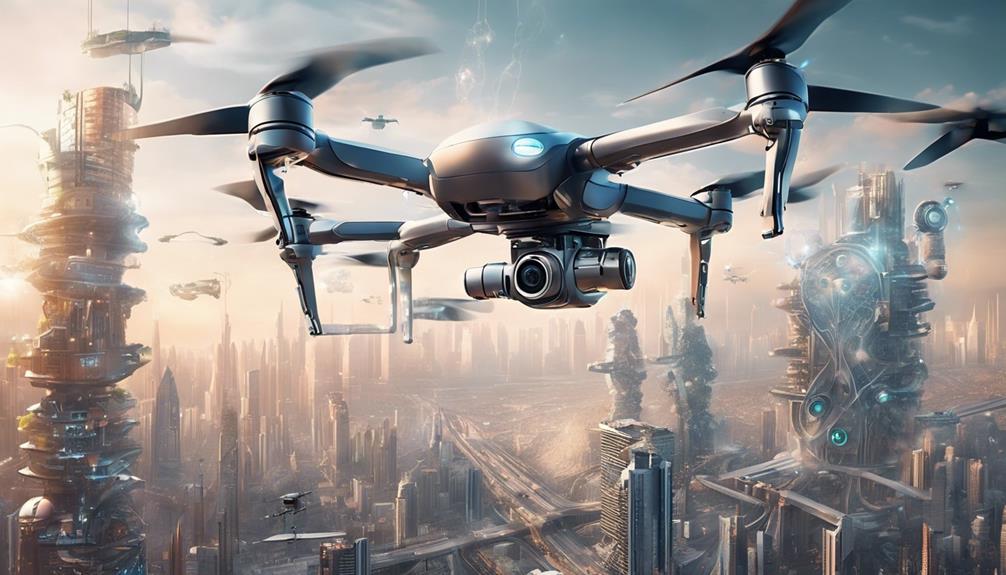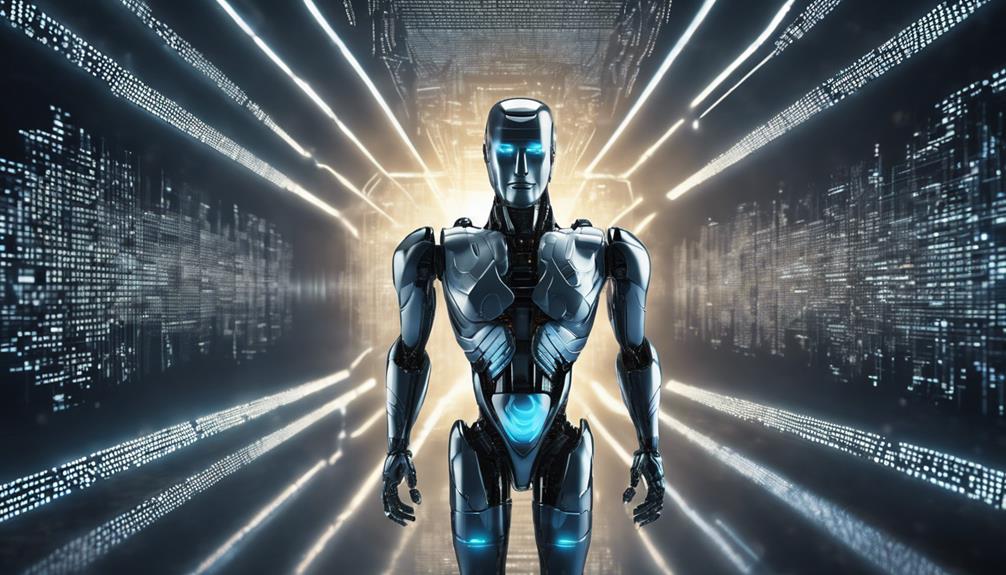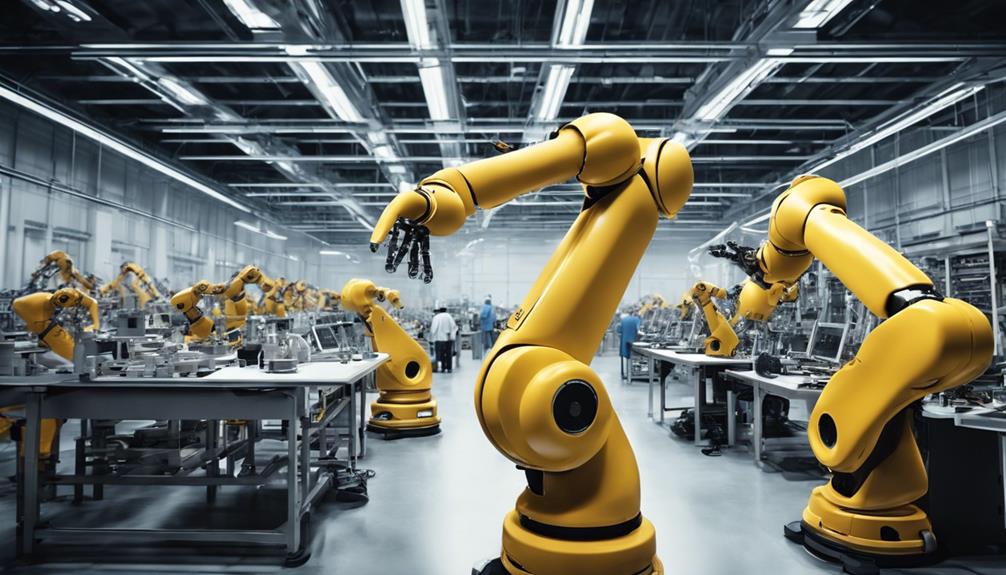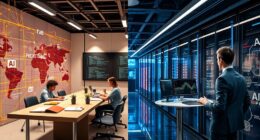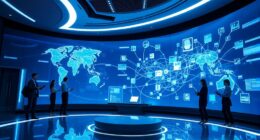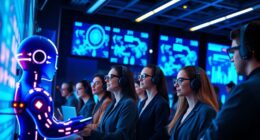In a time marked by rapid advancement in technology, the significant influence of artificial intelligence (AI) is clearly reshaping our societal framework. Whether it’s streamlining routine tasks or the sophisticated algorithms driving decision-making, the integration of AI into various sectors is undeniable.
As we witness this transformative shift unfold, it becomes imperative to understand not only the potential benefits but also the ethical and societal implications that accompany this evolution. The intricate interplay between humans and machines raises critical questions about the future landscape of work, social interactions, and the very essence of creativity itself.
Key Takeaways
- AI integration reshapes industries and traditional workforce dynamics.
- Automation handles skilled tasks in various sectors.
- AI becomes ingrained in daily life through virtual assistants and smart devices.
- Societal structures and norms evolve with AI advancements.
Impact of AI on Various Industries
The integration of AI technologies across diverse industries is fundamentally reshaping traditional workforce dynamics, leading to significant implications for sectors such as transportation, retail, and military operations. AI technologies are rapidly taking over tasks previously performed by humans, impacting industries at an unprecedented scale.
From autonomous vehicles revolutionizing transportation to AI systems automating retail operations, the shift towards automation systems is evident. Skilled tasks such as translation, legal research, and journalism are now being efficiently handled by AI, raising concerns about job loss and the future of work in these sectors.
The development of autonomous vehicles, while promising in terms of efficiency and safety, is also raising alarms about the potential displacement of workers in the road transport industry. As AI continues to advance, industries like automotive, aviation, space, and shipbuilding are increasingly adopting computer-integrated manufacturing, further streamlining processes but also posing challenges regarding human values and the role of the workforce.
AI researchers project that by 2025, 85 million jobs globally will be replaced by AI, underscoring the significant impact AI technologies are having on industries worldwide.
Role of AI in Daily Life

With AI technologies revolutionizing industries and reshapping workforce dynamics, its role in daily life has become increasingly pervasive and impactful.
AI in Daily Life:
- Virtual Assistants: AI is integrated into daily life through virtual assistants like Siri, Alexa, and Google Assistant, enhancing convenience and accessibility.
- Smart Home Devices: AI powers automation, security, and energy efficiency in smart home devices, improving comfort and reducing energy consumption.
- Personalized Recommendations: AI algorithms drive personalized recommendations on streaming platforms like Netflix and Spotify, enhancing user experience and content discovery.
- Navigation Apps: AI-driven navigation apps such as Google Maps and Waze optimize routes based on real-time traffic data, improving travel efficiency and reducing commute times.
The development of AI technology has enabled the integration of AI tools into various aspects of daily life, ranging from virtual assistants providing assistance to personalized recommendations enhancing entertainment experiences.
As AI continues to advance, its automation capabilities and ability to analyze vast amounts of data are reshaping how individuals interact with technology, indicating a profound impact on daily routines and activities.
Evolution of AI in Technology
Amidst the rapid advancement of technology, AI has emerged as a transformative force, shaping the very fabric of technological evolution.
The evolution of AI in technology can be traced back to the conceptualization of core technologies in the 1970s and '80s, which laid the groundwork for future advancements. Notably, in the 1990s, IBM's Deep Blue chess machine demonstrated early AI capabilities by defeating the world champion, showcasing its prowess in strategic decision-making.
Moving into the 2010s, significant progress in natural language processing enabled AI systems to comprehend and produce human language, marking a pivotal milestone in AI capabilities.
Major tech giants like Elon Musk, Microsoft, Amazon, and Google have heavily invested in AI research and development, driving innovation and pushing the boundaries of AI capabilities further.
As AI continues to evolve, it expands into new realms, with ongoing advancements reshaping the landscape of technology and enhancing human-machine interactions.
Challenges and Opportunities With AI
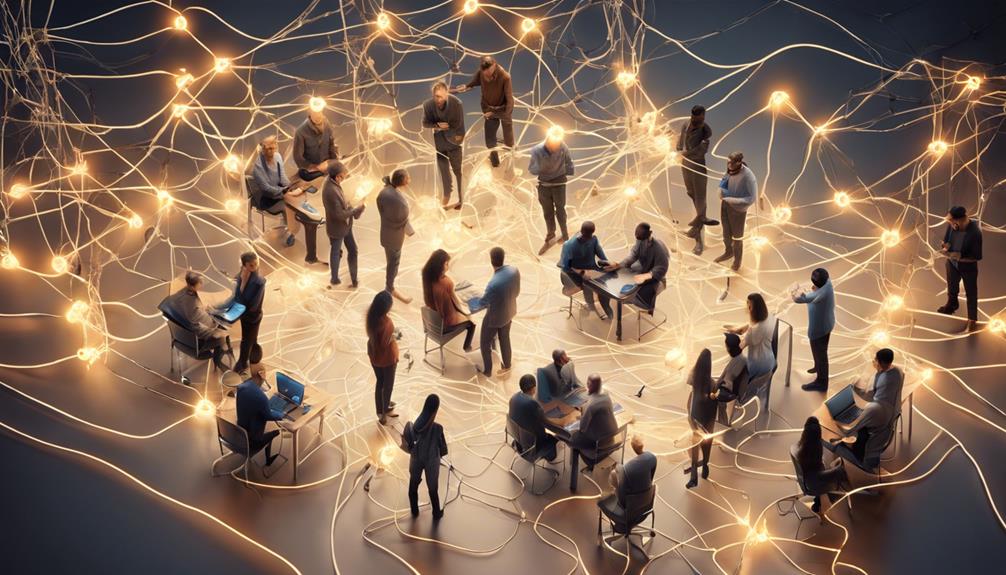
In the realm of AI, both challenges and opportunities abound, reshaping industries and redefining the future of work. When delving into the landscape of AI, it is crucial to recognize the potential risks and rewards it presents. Here are some key points to consider:
- Job Displacement: AI is projected to replace 85 million jobs globally by 2025, predominantly affecting roles in healthcare, agriculture, and industrial sectors.
- Automation Impact: Disruptions in hiring are expected due to AI's capacity to automate tasks traditionally performed by humans, leading to shifts in employment dynamics.
- Human Interaction: Jobs that necessitate complex tasks and significant human interaction, such as teachers, nurses, therapists, and tradespeople, are less susceptible to replacement by AI.
- New Opportunities: While AI may displace certain roles, it also redirects human effort towards more productive tasks, creating new job opportunities and transforming existing job functions.
Navigating the challenges and opportunities AI brings requires a strategic approach to harness its potential while mitigating its disruptive effects on the workforce.
Societal Implications of AI
The proliferation of AI technologies is catalyzing significant shifts in societal structures and norms, prompting a critical examination of the implications accompanying this technological evolution. AI advancements, while offering efficiency and convenience, raise concerns about job displacement across various industries such as customer service, transportation, and research analysis.
As society increasingly relies on AI for essential services like delivery and communication, questions surrounding privacy and job security become more pressing. Moreover, the integration of AI technologies like ChatGPT, although streamlining tasks, also sparks discussions about the impact on job prospects within creative industries.
Institutions and individuals alike must adapt to the rapid pace of AI advancements, which have the potential to significantly transform daily tasks and operations. Issues pertaining to AI's access to private information, control dynamics, and the potential obsolescence of existing technologies in light of AI advancements underscore the complex societal implications that accompany the integration of AI into our daily lives.
Frequently Asked Questions
How Is AI Going to Take Over the World?
AI's potential world domination hinges on superhuman intelligence, autonomous decision-making, and system hacking. Concerns of machines acting independently, posing threats to critical infrastructure, remain. Experts stress the need for transparent and accountable AI development to avert such scenarios.
How AI Is Replacing Humans?
AI is replacing humans across industries through automation. An example is the use of AI algorithms in customer service, streamlining communication processes. This shift raises concerns about job displacement and the need for upskilling to navigate the evolving job market.
How Long Will It Be Until AI Takes Over?
The timeline for AI surpassing human intelligence remains uncertain, with estimates ranging from a few decades to around 2045. Factors like AI research progress, funding, and ethical considerations all play significant roles in determining when AI might take over.
What Is the Point When AI Takes Over?
The point when AI takes over is a theoretical event where artificial intelligence surpasses human intelligence, potentially leading to autonomous decision-making. This scenario, often depicted in science fiction, raises concerns about ethical implications and control mechanisms.
Conclusion
In conclusion, the pervasive influence of AI across industries and daily life presents both challenges and opportunities for society.
As technology continues to evolve, the impact of AI on our lives will only grow in complexity and significance.
It is crucial for us to navigate the societal implications of AI with caution and foresight, recognizing the potential risks and benefits that come with its integration into our world.
The future of AI is uncertain, but one thing is clear – it is here to stay.
